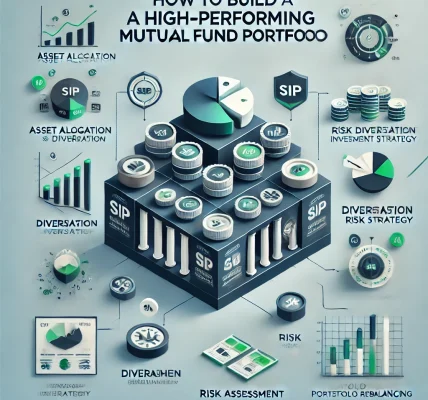Introduction
Mutual funds are a popular investment option due to their ability to offer diversification, professional management, and relatively low entry barriers. However, despite their many advantages, many investors still make common mistakes that can significantly impact their returns. Whether you are a beginner or an experienced investor, it’s essential to avoid these pitfalls to maximize your investment potential. In this blog, we will discuss the most common mistakes to avoid when investing in mutual funds, ensuring that you make smarter financial decisions.
1. Ignoring Your Investment Goals
One of the biggest mistakes investors make is not clearly defining their investment goals before choosing a mutual fund. Whether you’re saving for retirement, a child’s education, or buying a house, understanding your investment objectives is crucial to selecting the right fund.
- Short-Term vs. Long-Term Goals: If you are investing for short-term goals, equity mutual funds may not be the best option due to their high volatility. Conversely, for long-term goals like retirement, equity funds can offer greater growth potential.
Pro Tip: Align your mutual fund investments with your financial goals and risk tolerance to make the most of your investment.
2. Overlooking the Expense Ratio
The expense ratio is the annual fee charged by the fund house to manage your investment. A higher expense ratio can significantly eat into your returns over time, especially when compounded. While it’s important to consider the fund’s performance, the expense ratio is an often overlooked factor that can have a major impact.
- Low-Cost Funds: Funds with lower expense ratios, such as index funds, tend to provide better returns in the long run, especially when market conditions are flat or moderately rising.
Pro Tip: Always compare the expense ratios of different funds before making your investment. Lower fees can lead to higher returns over time.
3. Chasing Past Performance
While it’s tempting to invest in mutual funds with high past performance, remember that past results don’t guarantee future returns. Many investors fall into the trap of chasing recent high-performers without considering market cycles or the sustainability of the performance.
- Market Cycles: Funds that performed well in the past may not be able to replicate their success in the future due to changes in market conditions.
Pro Tip: Instead of focusing solely on past performance, consider other factors such as the fund’s investment strategy, risk profile, and management before investing.
4. Failing to Diversify
Concentration in a single asset class or sector can be risky. Some investors make the mistake of putting all their money in one fund or one sector, hoping for quick returns. However, this strategy can lead to significant losses if the market conditions turn unfavorable.
- Diversified Portfolio: Spread your investments across different asset classes (equity, debt, hybrid, etc.) to reduce risk and improve long-term stability.
Pro Tip: Diversify your mutual fund investments to reduce risk and ensure a more stable portfolio.
5. Timing the Market
Trying to time the market—buying funds when you think the market is at its lowest or selling when it’s at its peak—is a strategy that often leads to poor results. Market timing is incredibly difficult, and many investors end up making decisions based on emotions or short-term market movements.
- Market Volatility: Mutual fund investments should be made with a long-term perspective, rather than trying to capitalize on short-term fluctuations.
Pro Tip: Stick to a disciplined investment strategy, such as dollar-cost averaging, to mitigate the effects of market volatility.
6. Ignoring the Fund Manager’s Role
The performance of a mutual fund is largely influenced by the skill of the fund manager. A good fund manager can make a significant difference in the returns of a fund. Some investors overlook the importance of fund manager expertise when selecting a mutual fund.
- Active vs. Passive Management: Active fund managers seek to outperform the market, while passive fund managers simply track a market index. Both have their benefits, but the right choice depends on your investment goals and risk tolerance.
Pro Tip: Research the experience and track record of the fund manager to better understand how they may handle market fluctuations and manage the fund’s assets.
7. Neglecting to Monitor Your Investments
Investing in mutual funds is not a one-time task. Many investors make the mistake of investing and then forgetting about it. While mutual funds are a relatively low-maintenance investment, it’s still important to monitor the performance of your funds over time and make adjustments if necessary.
- Rebalancing: Over time, your asset allocation may shift due to the differing returns of various asset classes. Regularly reviewing and rebalancing your portfolio ensures that it remains in line with your goals.
Pro Tip: Periodically review your mutual fund investments and adjust your portfolio to reflect any changes in your financial goals or market conditions.
8. Investing Based on Hype or Popularity
Many investors are swayed by media hype or the popularity of certain mutual funds, often ignoring important factors like the fund’s risk, expense ratio, or suitability for their financial goals. Just because a fund is gaining popularity doesn’t mean it’s the right choice for you.
- Research-Driven Decisions: Make your investment decisions based on thorough research, not just popular trends or media recommendations.
Pro Tip: Before investing in a trending mutual fund, take the time to understand its performance, strategy, and risks.
9. Overlooking Tax Implications
Different mutual funds come with different tax treatments. For instance, equity funds and debt funds are taxed differently, and capital gains taxes can affect your overall returns. Failing to consider the tax implications of your investments can reduce your long-term wealth.
- Tax-Efficient Funds: Consider investing in tax-efficient funds like ELSS (Equity-Linked Savings Scheme) or tax-free bonds if tax savings are important to your financial strategy.
Pro Tip: Understand the tax implications of your mutual fund investments and choose funds that align with your tax-saving objectives.
Conclusion
Investing in mutual funds can be an effective way to grow wealth over time, but it’s essential to avoid common mistakes that can impact your returns. By setting clear goals, diversifying your portfolio, managing costs, and choosing the right funds, you can increase your chances of success.
Remember, mutual fund investing requires patience and discipline. Stay informed, monitor your investments, and avoid making decisions based on emotions or short-term market trends.




